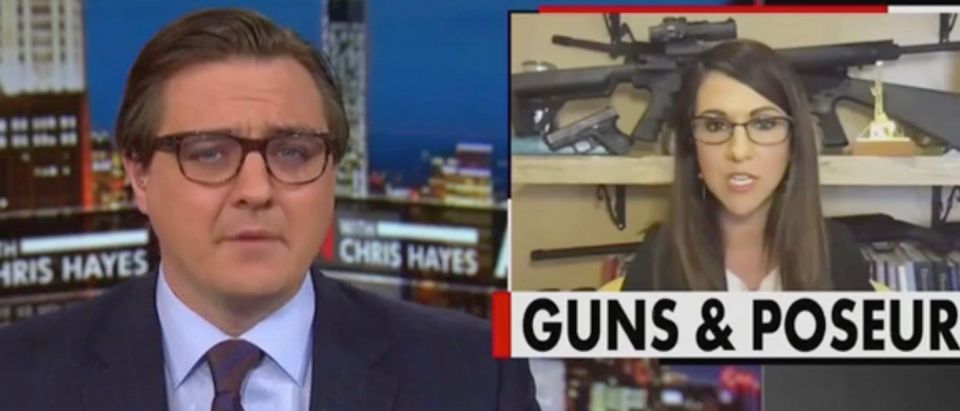MSNBC host Chris Hayes on Tuesday compared lawmakers who pose with guns in photos and videos to terrorists and violent revolutionaries, and claimed that they’re “committed to” or “open to the possibility of the violent overthrow of the government.”
During the broadcast of his show “All In With Chris Hayes,” Hayes criticized the increased use of gun imagery on “the right” and pointed to a threat of violence in the country’s current political environment as a reason to compare those who pose with guns to Al-Qaida, the Irish Republican Army and Cuban revolutionaries. (RELATED: ‘Idiots’ Think House Floor Is ‘Like The O.K. Corral’: Democratic Rep’s Message To Gun Carrying Members)
“It’s been unclear for some time what exactly it is that Donald Trump Jr. does, but like his father, he does love to make content. This weekend he posted a video of himself ranting about teachers unions while pointedly standing in front of a wall of guns. The whole thing has a ‘here are the thoughts from my bunker’ vibe. But, as weird as this image is, it’s kind of becoming a trend on the right,” Hayes began.
He continued, describing Republican Colorado Rep. Lauren Boebert, saying she “has built her political identity around guns,” and how she recently attended a virtual congressional committee meeting with “a mess of guns” in her background. “Apparently she just leaves them out because she fears she may need to fire multiple rounds of ammo into someone who comes into her — den?” he added.
Other lawmakers have also been known to pose with guns in political ads, including Georgia Republican Rep. Marjorie Taylor Greene, who received criticism for being featured holding a rifle next to images of various Democratic members of Congress.
Hayes compared Boebert and other Republicans to the former leader of Al-Qaida who was largely responsible for 9/11, the violent group of Irish guerillas that committed various terror attacks in the United Kingdom, as well as the revolutionaries led by former Cuban dictator Fidel Castro.
“Lots of people immediately noted that the use of guns in that way as props, and the implicit threat that comes with them, has a long, not necessarily great, history among various movements around the globe,” Hayes said. “Osama bin Laden, for one, liked to pose in front of a book shelf with a gun prominently displayed. The Irish Republican Army would display guns in its propaganda posters and its murals. Cuban revolutionaries, they posed with guns all the time, too.”
“No single side of the spectrum has a monopoly on this aesthetic. You can see it all over the world. It is unquestionably the aesthetic of armed struggle, of revolution or insurrection. A movement or faction that puts images of guns, a celebration of guns, front and center in its political aesthetic is a movement that’s engaging in something other than what we might call the normal rhetoric of elected democratic politics,” Hayes continued.
“You can’t escape the meaning of it. It communicates that they’re committed to, or at the very least, open to the possibility of, violent overthrow of the government, or the existing order,” he said.


